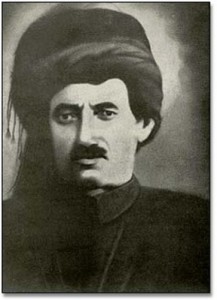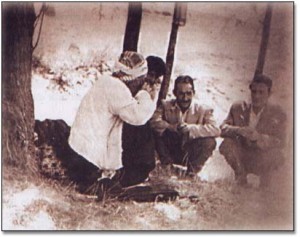 received the name Nursi. He received his basic education from the best-known scholars of the district. The extraordinary intelligence and capability of learning that he showed at a very early age made him popular with his teachers, colleagues and the people. When he was fifteen years old, in 1888, he silenced the distinguished scholars who had invited him to a debate (debate was a popular practice among scholars at the time) with his genius skills and knowledge. This later recurred several more times with various groups of scholars, and he thereby began to be called Bediuzzaman (Wonder of the Age).
The time Bediuzzaman Said Nursi spent in education paved the way in his mind for the thought that at a time when the world was entering a new and different age, where science and logic would prevail, the classical educational system of theology would not be sufficient to remove doubts concerning faith. He concluded that religious sciences should be taught at modern schools on the one hand, and modern sciences on the other. “This way,” he said, “the people of the school will be protected from unbelief, and those of the religious institutions from fanaticism.”
Bediuzzaman Said Nursi deemed the most severe disease afflicting man in the present age in his search for true happiness to be weakness in belief in God, and diagnosed the source of this disease as being the tendency to regard the modern sciences and religious science as separate and irreconcilable entities. Since man is, in reality, a being composed of both matter and spirit, to consider existence from the viewpoint of only one of this pair can yield no result other than an intensification of the crisis into which man has fallen. Unfortunately, modern science has remained totally incapable of finding a remedy for the spiritual wounds of mankind, despite all its brilliance. Confronted by this situation, as a man of science appreciating the necessity for a reconciliation between religion and modern science, Bediuzzaman Said Nursi examined the foundations of faith in a fashion suited to the mind of the age and in so doing produced the 6,000+ page work known as the Risale-i Nur.
received the name Nursi. He received his basic education from the best-known scholars of the district. The extraordinary intelligence and capability of learning that he showed at a very early age made him popular with his teachers, colleagues and the people. When he was fifteen years old, in 1888, he silenced the distinguished scholars who had invited him to a debate (debate was a popular practice among scholars at the time) with his genius skills and knowledge. This later recurred several more times with various groups of scholars, and he thereby began to be called Bediuzzaman (Wonder of the Age).
The time Bediuzzaman Said Nursi spent in education paved the way in his mind for the thought that at a time when the world was entering a new and different age, where science and logic would prevail, the classical educational system of theology would not be sufficient to remove doubts concerning faith. He concluded that religious sciences should be taught at modern schools on the one hand, and modern sciences on the other. “This way,” he said, “the people of the school will be protected from unbelief, and those of the religious institutions from fanaticism.”
Bediuzzaman Said Nursi deemed the most severe disease afflicting man in the present age in his search for true happiness to be weakness in belief in God, and diagnosed the source of this disease as being the tendency to regard the modern sciences and religious science as separate and irreconcilable entities. Since man is, in reality, a being composed of both matter and spirit, to consider existence from the viewpoint of only one of this pair can yield no result other than an intensification of the crisis into which man has fallen. Unfortunately, modern science has remained totally incapable of finding a remedy for the spiritual wounds of mankind, despite all its brilliance. Confronted by this situation, as a man of science appreciating the necessity for a reconciliation between religion and modern science, Bediuzzaman Said Nursi examined the foundations of faith in a fashion suited to the mind of the age and in so doing produced the 6,000+ page work known as the Risale-i Nur.
 Extraordinary to note is that Bediuzzaman Said Nursi’s life was a constant struggle with the government for his teachings as shown in his own words, when he was interviewed by Esref Edip (a well known journalist, in 1952 in Istanbul:
“Do they suppose that I am an egotist struggling to save myself alone? On the contrary, I would scrifice both my life in this world and the Hereafter to save the faith of the nation. I have known no worldly pleasures during my lifetime of eighty years and more. I have lived out my entire life either on the battlefield, in captivity, in dungeons or prisons, or in the courts of my native land. I have encountered all kinds of suffering and pain. I have been treated as a criminal at martial courts and exiled from one province to another like a vagabond. I have not been allowed visits in confinements, and I have been poisoned time and time again [19 times] and insulted in many ways, to the extent that sometimes I have preferred death over life. If our religion had not forbidden us to commit suicide, perhaps Said Nursi today would be buried under the earth. You see, my life has passed through many sufferings, trials, calamities, and disasters. I have devoted myself and my life to the cause of the faith, belief, security and salvation of the nation… I claim nothing and I do not call down curses upon them because in this way the Risale-i Nur has become a means to save the faith of some hundred thousand or a million people. I would save only myself by dying, but by enduring such sufferings and trials I was able to help save the faith of a great many people. All thanks be to God, the Exalted, I would sacrifice my salvation for the safety of the faith of the society. I am neither fond of Heaven nor afraid of Hell. May a thousand Saids be sacrificed for the faith of the nation! Heaven will become a dungeon for me if the Qur’an is without followers on earth. On the contrary, I will be pleased and content to agree to be burnt in the fire of Hell if I know that the faith of the nation is in safety.” -Bediuzzaman Said Nursi
After completing a lifetime of almost a century, with every minute spent in the service of faith, at the advanced age of 87, Bediuzzaman Said Nursi departed from this world on the morning of March 23, 1960 (Ramadan 27, 1379), in Urfa, Turkey, with complete honor, dignity and victory. Bediuzzaman Said Nursi left behind the Risale-i Nur Collection that would illuminate this and the forthcoming centuries and a love that would be handed over from generation to generation until eternity.]]>
Extraordinary to note is that Bediuzzaman Said Nursi’s life was a constant struggle with the government for his teachings as shown in his own words, when he was interviewed by Esref Edip (a well known journalist, in 1952 in Istanbul:
“Do they suppose that I am an egotist struggling to save myself alone? On the contrary, I would scrifice both my life in this world and the Hereafter to save the faith of the nation. I have known no worldly pleasures during my lifetime of eighty years and more. I have lived out my entire life either on the battlefield, in captivity, in dungeons or prisons, or in the courts of my native land. I have encountered all kinds of suffering and pain. I have been treated as a criminal at martial courts and exiled from one province to another like a vagabond. I have not been allowed visits in confinements, and I have been poisoned time and time again [19 times] and insulted in many ways, to the extent that sometimes I have preferred death over life. If our religion had not forbidden us to commit suicide, perhaps Said Nursi today would be buried under the earth. You see, my life has passed through many sufferings, trials, calamities, and disasters. I have devoted myself and my life to the cause of the faith, belief, security and salvation of the nation… I claim nothing and I do not call down curses upon them because in this way the Risale-i Nur has become a means to save the faith of some hundred thousand or a million people. I would save only myself by dying, but by enduring such sufferings and trials I was able to help save the faith of a great many people. All thanks be to God, the Exalted, I would sacrifice my salvation for the safety of the faith of the society. I am neither fond of Heaven nor afraid of Hell. May a thousand Saids be sacrificed for the faith of the nation! Heaven will become a dungeon for me if the Qur’an is without followers on earth. On the contrary, I will be pleased and content to agree to be burnt in the fire of Hell if I know that the faith of the nation is in safety.” -Bediuzzaman Said Nursi
After completing a lifetime of almost a century, with every minute spent in the service of faith, at the advanced age of 87, Bediuzzaman Said Nursi departed from this world on the morning of March 23, 1960 (Ramadan 27, 1379), in Urfa, Turkey, with complete honor, dignity and victory. Bediuzzaman Said Nursi left behind the Risale-i Nur Collection that would illuminate this and the forthcoming centuries and a love that would be handed over from generation to generation until eternity.]]>
